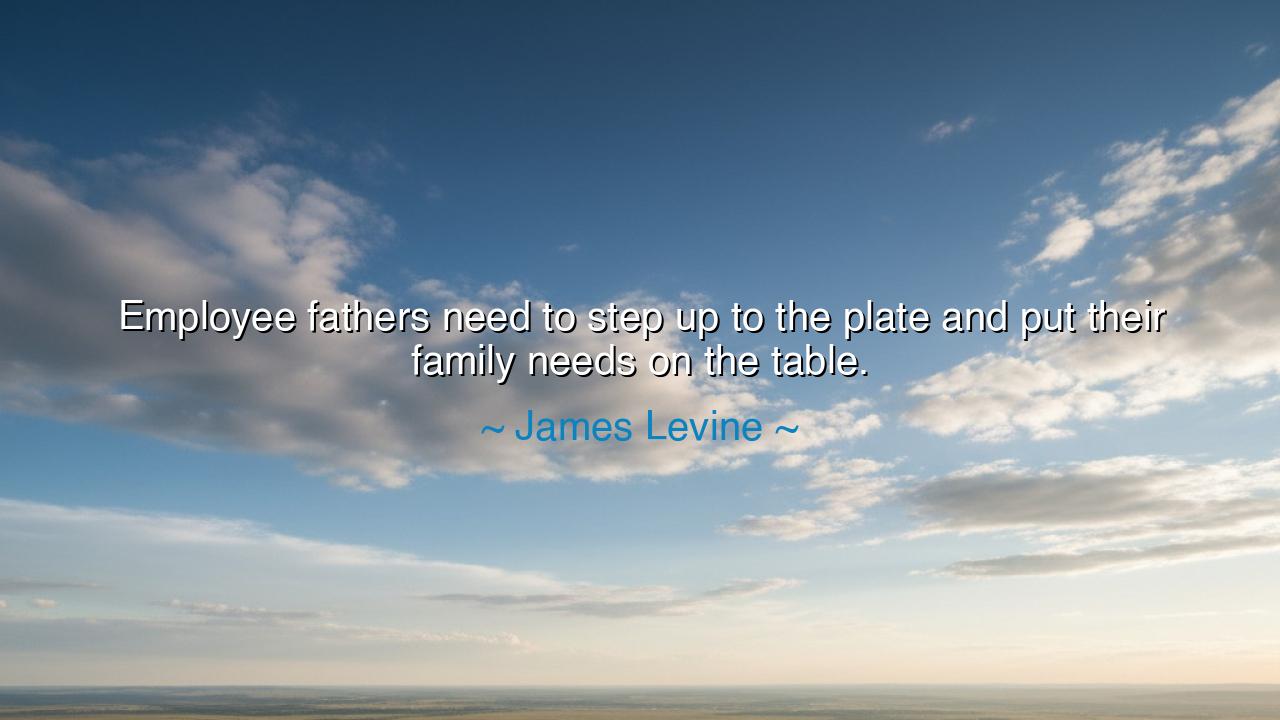
Employee fathers need to step up to the plate and put their






The words of James Levine, “Employee fathers need to step up to the plate and put their family needs on the table,” sound like a call to arms—gentle in tone yet powerful in purpose. They are a reminder, both moral and timeless, that fatherhood is not merely a title bestowed by birth, but a sacred duty that demands courage, presence, and responsibility. In these words lies a rebuke to the age of divided loyalties, when men pour their strength into their work but forget the quiet kingdom waiting at home. Levine’s call is not against labor, but against neglect. He speaks as one who understands that a man’s truest legacy is not the wealth he earns, but the love he gives and the values he instills.
James Levine, a researcher and advocate for fatherhood in the modern age, sought to remind society that the role of the father is not secondary but central. His words arose from decades of study and experience, from watching how the rhythms of modern work eroded the bonds between men and their families. In an era when success is measured in salaries and titles, Levine turned his gaze toward the heart. He saw that the man who forgets his family for his work forgets himself, for the home is the first and last measure of manhood. To “step up to the plate” means to face this truth boldly—to claim responsibility not only in the office, but in the home; not only before one’s employer, but before one’s children.
The table, in his words, is more than a symbol of conversation—it is the altar of family life. It is where bread is broken, where laughter and sorrow are shared, where children learn what love looks like in the simplest acts. To “put their family needs on the table” means to make them visible, to speak of them without shame, to recognize that the home’s well-being is as worthy of care as the company’s profits. Too long have many fathers sat silent while their families bore the cost of endless labor. Levine’s wisdom calls men to balance, to the courage of prioritizing the unseen and the unspoken—the emotional, spiritual, and relational needs of those they love.
The ancients understood this truth in their own way. The Roman statesman Cato the Elder, though famed for his discipline and civic duty, wrote that the true greatness of a man lay not in the empire he served, but in the virtue he cultivated within his household. “Govern your home,” he said, “as you would your nation—with justice, love, and attention.” Cato rose early not to chase fortune but to teach his son how to till the soil, how to read, how to honor the gods. For he knew that the empire would one day crumble, but the family, guided by integrity, would endure. The man who is strong at home will raise a generation stronger still; the man who neglects his home will leave behind a house without pillars.
Levine’s call to fathers is both heroic and humble. It is heroic, because it demands courage to defy the pressures of a society that glorifies productivity over presence. And it is humble, because it asks for simple acts: the willingness to listen, to show up, to take part in the sacred labor of nurturing life. Too often, men see their duty as providing financially, yet neglect the deeper needs—attention, example, tenderness. But children do not remember paychecks; they remember time. They remember stories told at bedtime, laughter over meals, the strength of a hand that guides without dominating. These are the invisible threads that weave a father’s legacy.
In the modern world, the employee father stands at a crossroads. He is pulled between ambition and affection, between his duty to provide and his longing to belong. Levine’s words offer a compass: do not let the world’s demands drown out the voice of your home. To “step up to the plate” means not to abandon ambition, but to align it with purpose. Work with integrity, but never forget who you are working for. Let your family’s needs be your guiding star—not as burdens, but as blessings that give your labor meaning.
So, O listener, let this teaching settle deeply in your heart. If you are a father, take time to look upon your home as the true measure of your strength. Bring your family’s needs to the table—speak of them, protect them, honor them. Stand firm in your work, but let your children see that your greatest loyalty lies with them. And if you are not yet a father, take this wisdom as preparation: for the worth of a man is not found in his earnings, but in his example.
For in the end, as James Levine reminds us, a man’s greatest success is not the empire he builds outside, but the love he sustains within. To step up for one’s family is to step into one’s true calling. Let every father hear this call and rise to it—not tomorrow, but today. For the world is filled with workers, but it is sustained by fathers. And when fathers remember their sacred duty, the home becomes strong, and through the home, the world itself is renewed.






AAdministratorAdministrator
Welcome, honored guests. Please leave a comment, we will respond soon